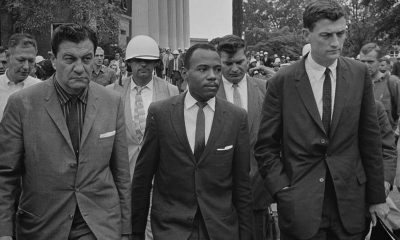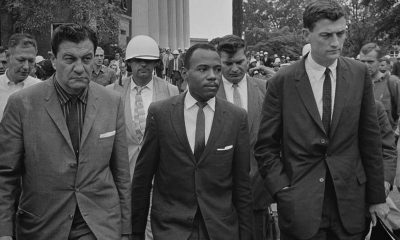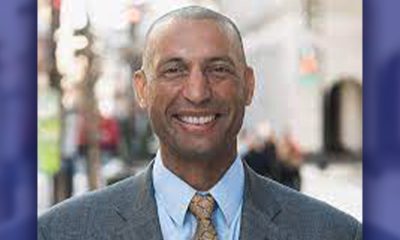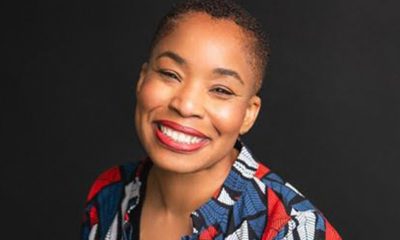Commentary
COMMENTARY: It’s Time to Stop Marginalizing African Americans in Public Higher Education
NNPA NEWSWIRE — The same states where African Americans are underrepresented in selective public colleges are also underfunding the open-access colleges that African Americans attend. According to Georgetown’s study, selective public colleges spend nearly three times more on instruction and academic support than open access colleges.
By Spencer Overton, Joint Center for Political and Economic Studies
Students across the country are putting final touches on their applications for some of our country’s most prestigious public institutions. Higher education officials and policymakers alike need to ensure that these universities are not underserving Black students.
Unfortunately, there’s a lot of work to do. A new study from the Georgetown University Center on Education and the Workforce shows that African Americans aren’t attending selective colleges (e.g. the University of Michigan, University of South Carolina, University of Houston, and others) at the same rates as their White peers. Even states with a sizable population of average-college-aged Black people (18-24 years old) are falling short. In Delaware, for example, African Americans account for 26 percent of 18-24 year olds, but only 6 percent of students at the University of Delaware.
These public colleges should serve a representative cross-section of students, and be engines of mobility for all students. Unfortunately, they are not. White students make up 54 percent of 18-24 year olds, but account for 64 percent of freshman enrollment in selective public colleges. Meanwhile, Black students account for 15 percent of 18-24 year olds in the United States, but only 7 percent of students in public selective colleges.
Some argue that African American students are less qualified to attend selective enrollment schools, but that isn’t the case. Among students who score in the upper half of standardized test scores, 31 percent of White students enroll in a selective college, but only 19 percent of Black students get that chance. All of these students are highly likely to graduate—students in the upper half of high school test distribution scores have an 85 percent chance of graduating from college. And evidence suggests that some schools may over-rely on these scores, a practice that may over-emphasize affluence and access to quality K-12 schooling. This can hide race and class inequality behind a façade of quantitative metrics.
The Georgetown study also acknowledges Black students may be choosing to attend colleges other than the highly selective public universities. In fact, Black students are going to college in greater numbers than ever. Unfortunately, the open-access colleges they are attending are overcrowded and under-resourced. This is likely affecting their chances of obtaining a degree, as graduation rates are significantly lower for students at open access colleges than they are at selective schools.
America’s higher education system sees the problem, but it is getting worse, not better. Over the last decade, Black representation at selective public colleges fell. For every 100 average college-age African Americans, four fewer are attending public selective colleges than a decade ago. The largest Black underrepresentation in selective public colleges is in the Deep South. In Mississippi, for example, African Americans account for 44 percent of 18-24 year olds, but only 11 percent of students at the state’s selective public college (the University of Mississippi).
The same states where African Americans are underrepresented in selective public colleges are also underfunding the open-access colleges that African Americans attend. According to Georgetown’s study, selective public colleges spend nearly three times more on instruction and academic support than open access colleges. At a time when we need to further invest in developing a skilled workforce for a changing labor market, it’s more important than ever to adequately support public open-access colleges and hold selective public colleges accountable to avoid underserving Black students.
We must bring an end to this separate and unequal education system. It is in our country’s best interest to engage with people from all communities to reach their educational potential. Increasing skills and expanding the number of people who have access to higher paying jobs will help grow the economic pie for all Americans.
Adequately supporting open-access colleges and holding selective public colleges accountable for educating people from all communities would take us a long way toward a public university system that truly serves the best interests of all members of the public.
Activism
Oakland Post: Week of April 17 – 23, 2024
The printed Weekly Edition of the Oakland Post: Week of April 17 – 23, 2024

To enlarge your view of this issue, use the slider, magnifying glass icon or full page icon in the lower right corner of the browser window. ![]()
Commentary
Opinion: Surviving the Earthquake, an Eclipse and “Emil Amok.”
Last Friday, a 4.8 magnitude earthquake shook New York City, reported as the “biggest earthquake with an epicenter in the NYC area since 1884” when a 5.2 quake hit. A bit bigger. The last quake similar to Friday’s was a 4.9 in 1783.Alexander Hamilton felt it — 241 years ago. That’s why New Yorkers were freaking out on Friday. They were in the room where it happens.

By Emil Guillermo
I’m a Northern Californian in New York City for the next few weeks, doing my one-man show, “Emil Amok, Lost NPR Host, Wiley Filipino, Vegan Transdad.”
I must like performing in the wake of Mother Nature.
Last Friday, a 4.8 magnitude earthquake shook New York City, reported as the “biggest earthquake with an epicenter in the NYC area since 1884” when a 5.2 quake hit. A bit bigger. The last quake similar to Friday’s was a 4.9 in 1783.
Alexander Hamilton felt it — 241 years ago.
That’s why New Yorkers were freaking out on Friday. They were in the room where it happens.
And it just doesn’t happen that often.
Beyonce singing country music happens more frequently.
When I felt New York shake last week, it reminded me of a time in a San Francisco TV newsroom when editors fretted about a lack of news an hour before showtime.
Then the office carpeting moved for a good ten seconds, and the news gods gave us our lead story.
On Friday when it happened in NYC, I noticed the lines in the carpeting in my room wiggling. But I thought it was from a raucous hotel worker vacuuming nearby.
I didn’t even think earthquake. In New York?
I just went about my business as if nothing had happened. After living near fault lines all my life, I was taking things for granted.
Considering the age of structures in New York, I should have been even more concerned about falling objects inside (shelves, stuff on walls) and outside buildings (signs, scaffolding), fire hazards from possible gas leaks, and then I should have looked for others on my floor and in the hotel lobby to confirm or aid or tell stories.
Of course, as a Californian who has lived through and covered quakes in the 4 to 6 magnitude range, I tried to calm down any traumatized New Yorker I encountered by taking full responsibility for bringing in the quake from the Bay Area.
I reassured them things would be all right, and then let them know that 4.8s are nothing.
And then I invited them to my consoling post-Earthquake performance of “Emil Amok, Lost NPR Host…”
It was the night of the eclipse.
ECLIPSING THE ECLIPSE
In New York City, the eclipse was about 90 percent visible. Good enough for me. Though a full solar eclipse is a celestial rarity, blockages of any sort aren’t generally celebrated. My one-man play is about growing up with the eclipsed history of American Filipinos and how I struggle to unblock all that.
For example, did you know the first Filipinos actually arrived to what is now California in 1587? That’s 33 years before the Pilgrims arrived in America on the other coast, but few know the Filipino history which has been totally eclipsed.
I was in Battery Park sitting on a bench and there was a sense of community as people all came to look up. A young woman sitting next to me had a filter for a cell phone camera. We began talking and she let me use it. That filter enabled me to take a picture of the main event with my iPhone.
For helping me see, I invited her and her boyfriend to come see my show.
Coincidentally, she was from Plymouth, Massachusetts, near the rock that says the year the Pilgrims landed in 1620.
In my show she learned the truth. The Pilgrims were second.
History unblocked. But it took a solar eclipse.
Next one in 2044? We have a lot more unblocking to do.
If you’re in New York come see my show, Sat. April 13th, 5:20 pm Eastern; Fri. April 19, 8:10 pm Eastern; and Sun. April 21st 5:20 pm Eastern.
You can also livestream the show. Get tickets at www.amok.com/tickets
About the Author
Emil Guillermo is a journalist and commentator. He does a mini-talk show on YouTube.com/@emilamok1. He wishes all his readers a Happy Easter!
Commentary
Commentary: Republican Votes Are Threatening American Democracy
In many ways, it was great that the Iowa Caucuses were on the same day as Martin Luther King Jr. Day. We needed to know the blunt truth. The takeaway message after the Iowa Caucuses where Donald Trump finished more than 30 points in front of Florida Gov. De Santis and former South Carolina Governor Nikki Haley boils down to this: Our democracy is threatened, for real.

By Emil Guillermo
In many ways, it was great that the Iowa Caucuses were on the same day as Martin Luther King Jr. Day.
We needed to know the blunt truth.
The takeaway message after the Iowa Caucuses where Donald Trump finished more than 30 points in front of Florida Gov. De Santis and former South Carolina Governor Nikki Haley boils down to this: Our democracy is threatened, for real.
And to save it will require all hands on deck.
It was strange for Iowans to caucus on MLK day. It had a self-cancelling effect. The day that honored America’s civil rights and anti-discrimination hero was negated by evening.
That’s when one of the least diverse states in the nation let the world know that white Americans absolutely love Donald Trump. No ifs, ands or buts.
No man is above the law? To the majority of his supporters, it seems Trump is.
It’s an anti-democracy loyalty that has spread like a political virus.
No matter what he does, Trump’s their guy. Trump received 51% of caucus-goers votes to beat Florida Gov. Ron DeSantis, who garnered 21.2%, and former South Carolina Gov. Nikki Haley, who got 19.1%.
The Asian flash in the pan Vivek Ramaswamy finished way behind and dropped out. Perhaps to get in the VP line. Don’t count on it.
According to CNN’s entrance polls, when caucus-goers were asked if they were a part of the “MAGA movement,” nearly half — 46% — said yes. More revealing: “Do you think Biden legitimately won in 2020?”
Only 29% said “yes.”
That means an overwhelming 66% said “no,” thus showing the deep roots in Iowa of the “Big Lie,” the belief in a falsehood that Trump was a victim of election theft.
Even more revealing and posing a direct threat to our democracy was the question of whether Trump was fit for the presidency, even if convicted of a crime.
Sixty-five percent said “yes.”
Who says that about anyone of color indicted on 91 criminal felony counts?
Would a BIPOC executive found liable for business fraud in civil court be given a pass?
How about a BIPOC person found liable for sexual assault?
Iowans have debased the phrase, “no man is above the law.” It’s a mindset that would vote in an American dictatorship.
Compare Iowa with voters in Asia last weekend. Taiwan rejected threats from authoritarian Beijing and elected pro-democracy Taiwanese vice president Lai Ching-te as its new president.
Meanwhile, in our country, which supposedly knows a thing or two about democracy, the Iowa caucuses show how Americans feel about authoritarianism.
Some Americans actually like it even more than the Constitution allows.
About the Author
Emil Guillermo is a journalist and commentator. He does a mini-talk show on YouTube.com/@emilamok1.
-

 Activism4 weeks ago
Activism4 weeks agoOakland Post: Week of March 27 – April 2, 2024
-

 #NNPA BlackPress4 weeks ago
#NNPA BlackPress4 weeks agoCOMMENTARY: D.C. Crime Bill Fails to Address Root Causes of Violence and Incarceration
-

 #NNPA BlackPress4 weeks ago
#NNPA BlackPress4 weeks agoFrom Raids to Revelations: The Dark Turn in Sean ‘Diddy’ Combs’ Saga
-

 #NNPA BlackPress4 weeks ago
#NNPA BlackPress4 weeks agoMayor, City Council President React to May 31 Closing of Birmingham-Southern College
-

 #NNPA BlackPress4 weeks ago
#NNPA BlackPress4 weeks agoBaltimore Key Bridge Catastrophe: A City’s Heartbreak and a Nation’s Alarm
-

 #NNPA BlackPress4 weeks ago
#NNPA BlackPress4 weeks agoBaltimore’s Key Bridge Struck by Ship, Collapses into Water
-

 #NNPA BlackPress4 weeks ago
#NNPA BlackPress4 weeks agoBeloved Actor and Activist Louis Cameron Gossett Jr. Dies at 87
-

 Community1 week ago
Community1 week agoFinancial Assistance Bill for Descendants of Enslaved Persons to Help Them Purchase, Own, or Maintain a Home























































1 Comment